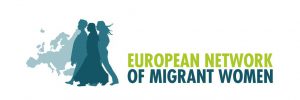European Network of Migrant Women

Trafficking in human beings for the purposes of sexual exploitation is a violation of human rights that affects disproportionately women and girls. In Western and Southern Europe, it is the most prevalent form of human trafficking. In 2018, 66% of all detected victims of trafficking in human beings were trafficked for sexual exploitation, amongst which 90% were women and girls.
Nigerian women and girls make up the largest group of third-country nationals victims of human trafficking for the purpose of sexual exploitation in the European Union. Most of the victims come from Edo State. It is estimated that approximately 80% of Nigerian women and girls arriving in Europe are potential victims of trafficking for sexual exploitation, making Nigeria one of the biggest trafficking in human beings origin country in West Africa.
In France, according to the Central Office for the Suppression of Trafficking in Human Beings (COSTHB), 80% of women in prostitution are from migrant backgrounds. France is both a transit and destination country for human trafficking and Nigerian women constitute the largest group that falls victim of sexual exploitation in the country.
Many co-existing factors enhance Nigerian women’s risks of being victims of trafficking for the purpose of sexual exploitation including: violence against women and sexist discrimination, illiteracy, poverty, unemployment and corruption, the absence or inadequacy of social security and welfare systems and the abuse of traditional fostering by family members, climate change, and the disruption of support systems (such as loss of family members). Other factors that have contributed to the growth of the trafficking phenomenon are restrictive migration policies in Europe. The demand for prostitution in Europe is also a very impactful factor.
It is shown in ENoMW’s Expert Statement – in the context of French landmark case about Nigerian women’s access to international protection – that Nigerian women and girls victims of trafficking share a common experience and are looked at in a particular way by their native society independently of their will, making them a social group in the sense of the Geneva Convention. Furthermore, this social group faces a specific situation of heightened risks of persecution due to psychological consequences of the exploitation, stigmatisation and ostracism as a person who has been trafficked, as well as the submission to a spiritual/psychological hold linked to the oath taken as part of the juju, and the lack of economic opportunities.